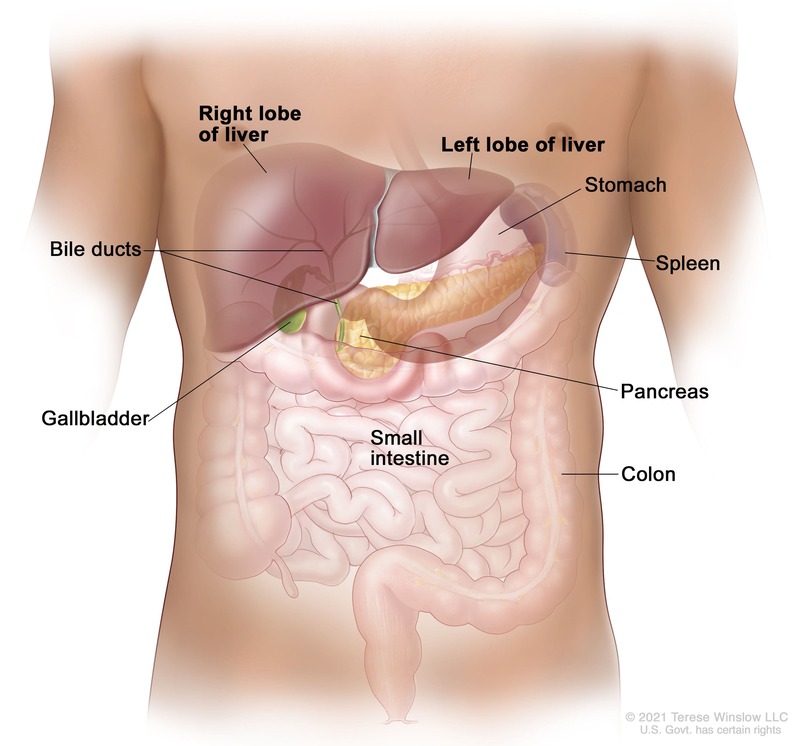Adult Primary Liver Cancer is a disease in which cancer cells form in the tissues of your liver. Locally Advanced Primary Liver Cancer is when the liver cancer can not be treated with surgery. This is also called Unresectable Liver Cancer.
Tap “Watch Now” for an easy-to-understand overview of Primary Unresectable Liver Cancer.
- Primary Unresectable Liver Cancer
Overview
Primary Liver Cancer is cancer that has been first found in the tissues of your liver. If the cancer was found in another organ first, it’s called Secondary or Metastatic Liver Cancer.
Unresectable Primary Liver Cancer diagnosis is when surgery is not a treatment option because the tumor can’t be removed safely, without damaging your liver function.
Often surgery is not an option because the tumor in your liver is too large, the tumor is too close to an important blood vessel, there is more than one tumor in your liver, or other risk factors have been identified by your doctor.
What Tests Will I Need and Why?
Blood and Imaging tests are done to understand your general health, confirm your diagnosis and determine your cancer stage.
Doctors may also look for hepatitis and liver damage to tell you more about what caused your cancer.
Tissue analysis is also typically done to identify the cancer cell type, which is critical to finding the best treatment option for you.
If your treatment team has not already performed tests to determine your cancer’s features, please ask your doctor when these tests will be performed.
Re-read this summary as needed and then tap, “Compare My Treatment Options Now“. Our unique Comparison Page will help you understand your FDA-approved treatment options including, who can help you pay for your treatment, where and how each is given and what side-effects you may experience.

Cancer Research U.K. CC BY-SA 4
Recommended Liver Cancer Videos

Liver Cancer In 4 Minutes
Hear from Doctor Sachin MODI

How Cancer Spreads
Metastatic = Advanced

Diagnosing Your Cancer
How Does a CT Scan Work?

Diagnosing Your Cancer
How Does a PET Scan Work?

Exercise! You Can Do It
Reducing Side Effects & More
Commonly Searched Questions
Recurrent Primary Liver Cancer Symptoms
These are some common symptoms you might experience if you have Recurrent primary liver cancer.
- Yellowing of the eyes and skin (jaundice)
- Pale stool and dark urine
- Feeling weak constantly
- An abnormal swollen abdomen
- Nausea and vomiting
- Unintentional weight loss
- A lump on the right side below the rib cage
- Pain in the abdomen
Source: Cancer.gov
Recurrent Primary Liver Cancer Treatment
These are some common treatment options that are available for your recurrent primary liver cancer:
- Liver transplant
- Surgery to remove the liver cancer
- Palliative therapy
- Ablation therapy
Now Click Here To Compare Your Latest Treatment Options.
Source: Cancer.gov
Recurrent Primary Liver Cancer Survival Rate
According to SEER data, localized liver cancer has a survival rate of 36.1%. This generally means that people with localized liver cancer are 36.1% as likely as people without cancer to live for 5 years after the diagnosis.
Source: Cancer.gov
Recurrent Primary Liver Cancer Recurrence Rate
The recurrence rate for primary liver cancer varies based on several factors, including the stage of the cancer at initial diagnosis, the type of treatment received, and the overall health of the patient. Generally, liver cancer has a high recurrence rate, with studies indicating that up to 70% of patients with early-stage liver cancer may experience a recurrence within 5 years after treatment. The risk of recurrence is higher in patients with advanced stages of cancer or those who did not receive effective treatment initially. Recurrence can occur in the liver or other parts of the body, and ongoing monitoring and follow-up care are essential for managing the risk of recurrence.
Source: Cancer.gov
Recurrent Primary Liver Cancer Definition
Recurrent primary liver cancer is defined as liver cancer that has returned after treatment. This recurrence can occur in the liver itself or in other parts of the body. It is categorized based on whether the cancer returns to the original site in the liver or spreads to other organs. Recurrent liver cancer may be detected through imaging tests or when symptoms reappear. Treatment options for recurrent liver cancer depend on factors such as the location and extent of the recurrence, previous treatments, and the patient’s overall health.
Source: Cancer.gov
Recurrent Primary Liver Cancer Prevention
While specific strategies for preventing recurrent primary liver cancer are not well-defined, general approaches to reduce the risk of recurrence and improve overall liver health include:
- Manage Chronic Liver Conditions: Effectively manage underlying conditions like hepatitis B or C, cirrhosis, or fatty liver disease with medical guidance.
- Avoid Alcohol: Limit or avoid alcohol consumption to reduce liver damage and lower the risk of recurrence.
- Maintain a Healthy Weight: Achieve and maintain a healthy weight through a balanced diet and regular exercise.
- Healthy Diet: Eat a balanced diet rich in fruits, vegetables, and whole grains, and low in saturated fats.
- Regular Medical Follow-up: Adhere to regular follow-up appointments with your healthcare provider to monitor liver health and detect any recurrence early.
- Avoid Hepatotoxic Substances: Stay away from substances that can harm the liver, including certain medications and chemicals.
Source: Cancer.gov






